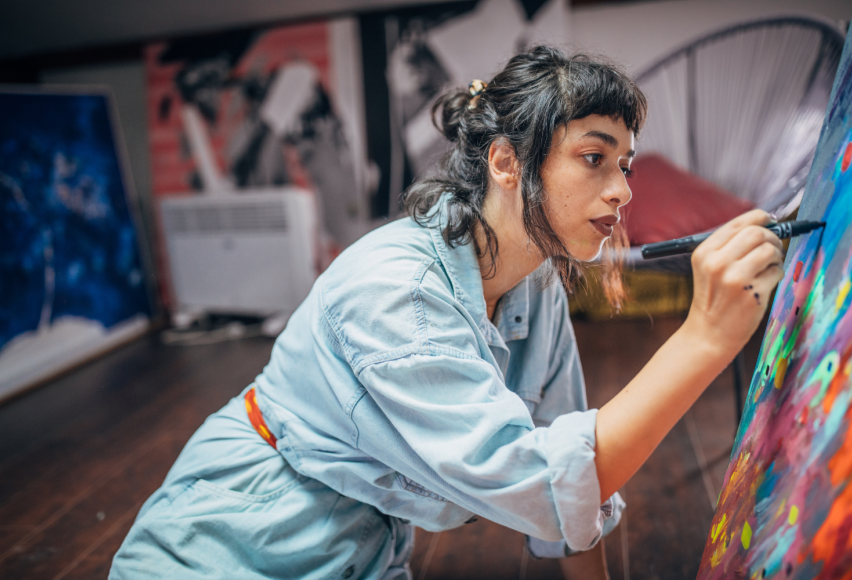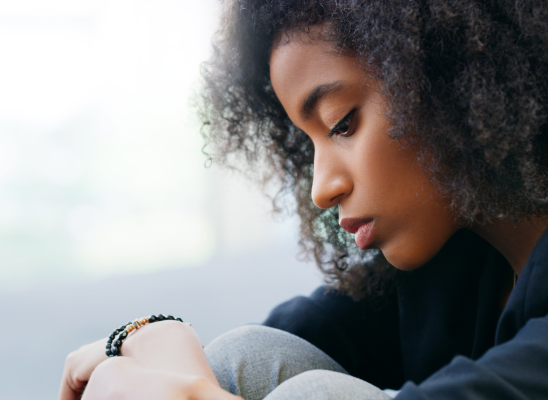Express Yourself: Skin Picking and the Creative Arts

Online test
Find out the severity of your symptoms with this free online test
Dermatillomania, commonly known as skin picking disorder, is a mental health disorder characterized by compulsive picking of the skin that results in significant damage to the skin, emotional distress, and impaired psychosocial functioning. People living with skin picking disorder often report feeling isolated and alone in their struggle. Feelings of embarrassment and shame, along with fears of being judged for their condition, can lead to avoidance of social situations and a sense of isolation. They may even avoid seeking treatment for fear of being judged or misunderstood.
Finding effective coping strategies is crucial not just for managing symptoms but also for nurturing a sense of well-being. Creative activities such as art, writing, and music can be powerful tools for coping, and even be an adjunct to therapy. These expressive mediums can provide a safe and personally meaningful way to explore and express emotions, decrease stress, and create distraction from the urge to pick.
Art
Art and art therapy have long been recognized for their healing properties, especially in the context of psychological disorders. Artistic activities offer a pathway for self-expression, release of emotion, healing, and communication. Some people who live with skin picking, describe engaging in creative art as a sort of physical distraction technique, focusing on the piece of art being created and keeping hands busy, thus reducing the opportunity to pick at the skin. Busy hands is often cited by people dealing with skin picking as a helpful coping strategy.
Engaging in an artistic activity allows for the expression of feelings that might be difficult to articulate verbally. Art provides a way of externalizing the struggles, emotional pain, and anxiety that come with skin picking. Techniques such as painting, sculpting, or drawing enable individuals to visualize their emotional state, sometimes revealing underlying emotions that they weren't previously aware of. This form of expression can be profoundly cathartic, helping to reduce feelings of stress or emotional turmoil that might trigger skin-picking episodes.
Art can also be used as a form of self-care and personal reflection. It provides a sense of accomplishment and can boost self-esteem, which is often compromised in those living with skin picking. Some people find participating in group art activities helpful. Group art therapy has been shown to enhance the benefits of engaging in creative arts including:
- Increased self-esteem
- Improved mood
- Increased sense of community and belonging
- Increased emotional expression
Even if you don’t consider yourself “artsy”, art can still offer you a way to creatively express what you’re feeling. The great thing about art is that there is no right or wrong way to do it. Try drawing a feeling or pre-printed coloring pages (they make coloring books for adults too!), or simply doodle. Try different tools – markers, colored pencils, colored paper. Let your creative side come out and see where it takes you.
Writing
Writing is another powerful medium that has been used for eons as a means of self-expression and dealing with thoughts and feelings. Expressive writing has consistently been shown to improve both physical and mental health. Whether through journaling, poetry, or storytelling, writing provides a safe, private platform for self-expression. It helps in organizing thoughts, processing emotions, and perhaps most critically, in making sense of one's experiences.
Journaling is a popular form of expressive writing that many people find helpful. While it’s sometimes used as a part of therapy, you can also do it on your own. Journaling gives you a private place to openly express and process your feelings in words that you find most helpful. In other words, you don’t have to mince words or tiptoe around an issue. For some, this may be the only place they feel safe enough to say it “their way”.
Regularly writing down your thoughts and feelings can lead to a greater understanding of the emotional triggers that lead to your skin picking, which is a crucial step in managing the disorder. Writing can also foster a greater sense of empathy and self-compassion, reducing feelings of guilt or shame that often accompany skin picking.
For those who are more drawn to creative writing, crafting stories or poems can offer a way to view their situation from a new perspective. Like other forms of writing, creative writing can provide a means of emotional release and an opportunity to gain insight into their disorder.
Poetry is one such means of creatively exploring and may be helpful for those living with a body-focused repetitive behavior (BFRB) like skin picking. Both reading and writing poetry can be quite pleasing and, in some cases, even therapeutic. Poetry therapy is a form of bibliotherapy that uses poetry to aid in the treatment process and has shown to be helpful in reducing symptoms.
If you’re not an artist or a writer, don’t despair. There’s another creative outlet to try. Music.
Music
Whether listening to your favorite songs or making music by singling or playing an instrument, music has a profound influence on your physical and emotional well-being. Music and music therapy have shown to be beneficial for a wide range of mental health issues including anxiety and depression, which often co-occur with skin picking.
Music tends to have a calming effect and can markedly relieve stress, which is often cited as a trigger to skin picking. Creating music, whether through singing, playing an instrument, or composing, can also serve as an excellent distraction method, engaging both the mind and the hands.
Music has long been used as a means of communication and emotional expression. Music can mirror one's feelings and help to process them. Music can also be a healthy means of acknowledging and releasing emotions. Music also has a way of creating social-emotional connections. Whether experienced individually or in groups, music can enhance feelings of connection with others, which is crucial for someone who may feel isolated.
Finding Your Creative Outlet
If adding a creative outlet to help deal with your skin picking is something you want to try, it’s easy to do. The good news is, you don’t have to be an artist or a writer or a musician to enjoy creating something. Simply start where you are.
- Choose an activity that resonates: A great place to start is to simply try something that interests you. Maybe you saw a drawing or work of art that caught your attention. Maybe you find yourself doodling in notebooks. Or maybe you find yourself drawn to music in some way. Start there. You can always change to something else if your first choice doesn’t feel like the right fit.
- Choose an activity that feels enjoyable and fulfilling. Choosing something that brings you enjoyment or a sense of fulfillment makes it more likely that you’ll continue.
- Set realistic goals: Start with small, achievable goals, especially if you’re learning something new. Learning new skills takes time and patience. Let yourself embrace the process.
- Create a routine: Incorporating creative activities into a daily routine can enhance their effectiveness as a coping mechanism. A routine can provide structure, which is beneficial in managing skin picking.
- Seek professional guidance: Consulting with a therapist, especially one experienced in art or music therapy, can provide valuable insights and guidance on how using expressive arts can be incorporated into your treatment plan.
- Connect with others: If you feel comfortable, join an art class or writing group or even a community choir. These are great ways to connect with others who enjoy the same creative activities and can help alleviate feelings of isolation often associated with skin picking. If in-person classes or groups don’t feel comfortable, consider connecting with others via online classes or groups.
The Takeaway
Creative outlets are an effective way to express and process complex emotions and build coping strategies. They bring opportunities for improving self-esteem, reducing stress, and fostering social connections. While creative arts activities are not a substitute for professional treatment, they can be a valuable component of a comprehensive approach to managing skin picking. Embracing your creativity can bring symptom relief, personal fulfillment, and enhance emotional resilience.
References
1. Anderson, S., Clarke, V., & Thomas, Z. (2022). The problem with picking: Permittance, escape and shame in problematic skin picking. Psychology and Psychotherapy: Theory, Research and Practice, 96(1), 83-100. https://bpspsychub.onlinelibrary.wiley.com/doi/10.1111/papt.12427
2. Shukla, A., Choudhari, S. G., Gaidhane, A. M., & Quazi Syed, Z. (2022). Role of Art Therapy in the Promotion of Mental Health: A Critical Review. Cureus, 14(8), e28026. https://www.ncbi.nlm.nih.gov/pmc/articles/PMC9472646/
3. Shukla, A., Choudhari, S. G., Gaidhane, A. M., & Quazi Syed, Z. (2022). Role of Art Therapy in the Promotion of Mental Health: A Critical Review. Cureus, 14(8), e28026. https://www.ncbi.nlm.nih.gov/pmc/articles/PMC9472646/
4. Expressive writing can help your mental health. (2024, March). https://www.apa.org. https://www.apa.org/news/podcasts/speaking-of-psychology/expressive-writing
5. Pennebaker, J. W. (2012). Opening up: The healing power of expressing emotions. Guilford Press. https://psycnet.apa.org/record/1997-05130-000
6. Golden, T. L., Springs, S., Kimmel, H. J., Gupta, S., Tiedemann, A., Sandu, C. C., & Magsamen, S. (2021). The use of music in the treatment and management of serious mental illness: A global scoping review of the literature. Frontiers in Psychology, 12. https://www.frontiersin.org/journals/psychology/articles/10.3389/fpsyg.2021.649840/full
7. Skin Picking: Identifying and Working with Triggers [Video]. (2021, February). YouTube. https://www.youtube.com/watch?v=4_w_0ecc500
8. Reynolds, F. (2023, August 1). The Transformative Power of Music in Mental Well-Being. Just a moment... https://www.psychiatry.org/news-room/apa-blogs/power-of-music-in-mental-well-being
Online test
Find out the severity of your symptoms with this free online test
Start your journey with SkinPick
Take control of your life and find freedom from skin picking through professional therapy and evidence-based behavioral techniques.
Start Now



